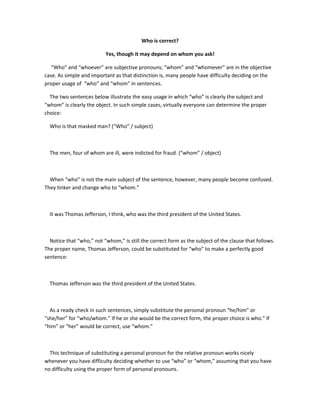
Who is correct
- 1. Who is correct? Yes, though it may depend on whom you ask! “Who” and “whoever” are subjective pronouns; “whom” and “whomever” are in the objective case. As simple and important as that distinction is, many people have difficulty deciding on the proper usage of “who” and “whom” in sentences. The two sentences below illustrate the easy usage in which “who” is clearly the subject and “whom” is clearly the object. In such simple cases, virtually everyone can determine the proper choice: Who is that masked man? (“Who” / subject) The men, four of whom are ill, were indicted for fraud. (“whom” / object) When “who” is not the main subject of the sentence, however, many people become confused. They tinker and change who to “whom.” It was Thomas Jefferson, I think, who was the third president of the United States. Notice that “who,” not “whom,” is still the correct form as the subject of the clause that follows. The proper name, Thomas Jefferson, could be substituted for “who” to make a perfectly good sentence: Thomas Jefferson was the third president of the United States. As a ready check in such sentences, simply substitute the personal pronoun “he/him” or “she/her” for “who/whom.” If he or she would be the correct form, the proper choice is who.” If “him” or “her” would be correct, use “whom.” This technique of substituting a personal pronoun for the relative pronoun works nicely whenever you have difficulty deciding whether to use “who” or “whom,” assuming that you have no difficulty using the proper form of personal pronouns.
- 2. Even when the word order must be altered slightly, you can use the technique: Mrs. Dimwit consulted an astrologer whom she met in Seattle. (She met him in Seattle.) Jones is the man whom I went fishing with last spring. (I went fishing with him.) Joyce is the girl who got the job. (She got the job.) Whom can we turn to in a time of crisis? (Can we turn to her?) The delegates differed as to who they thought might win. (Not whom. Here the entire clause is the object of the preposition. Substitution is particularly helpful in cases such as this. They thought he might win.) Who is that masked man? (subject) The men, four of whom are ill, were indicted for fraud. (object) Three “easy-to-use” rules so you'll always get it correct Rule #1: Substitute “he/him” or “she/her”: If it's either “he” or “she,” then it's “who;” if it's “him” or “her,” then it's “whom.”
- 3. Rule #2: Every verb with a tense in a sentence must have a subject. And that word is always in the nominative case, so it's “who.” For example: In this sentence, “I decided to vote for whoever called me first”: • “I” is the subject of “decided” • “he” (whoever) is the subject of the verb “called.” In the sentence, “Give it to whoever deserves it”:([You] give it to whoever deserves it.) • “he” (whoever) is the subject of the verb “deserves.” This rule supersedes the first rule as it relates to “who” and “whom.” Note: Related to this rule is one that says: The subject of a phrase is always attached to that phrase — no matter what. For example: Ask whoever reads that book to answer the question. Break down the sentence thusly: (You) ask him (he reads that book) to answer the question. In the phrase “he reads that book,” you cannot separate the subject “he” from the phrase to which it is attached. If you remember these two rules — substitute “he/him” or “she/her,” and that every verb with a tense must have a subject — you should solve the “who/whom” quandary every time. If you apply those two rules and you're still not sure, apply the all-important Rule #3. Rule #3: Give it a sincere and honest effort to determine if it's “who” or “whom.” If it takes more than a 30 seconds to figure it out, pick the one that sounds best to the ear (read it aloud) and move on. Why? Because even grammarians are likely to squabble over which to use. But always — always — apply rules #1 and #2 before using Rule #3.